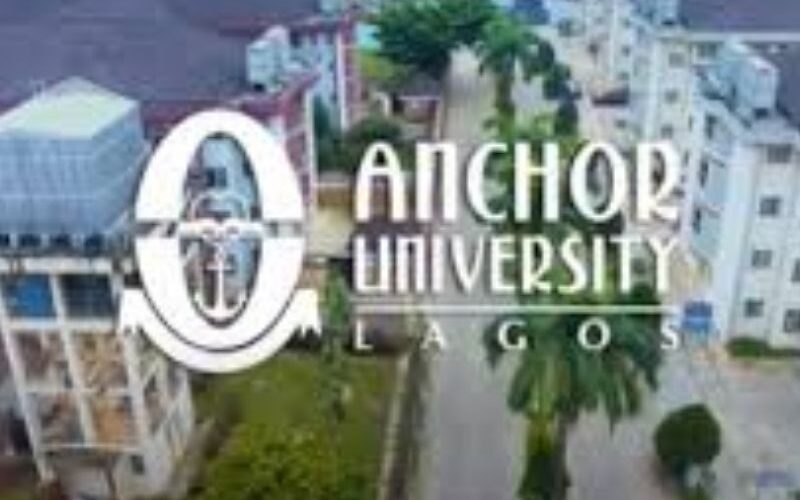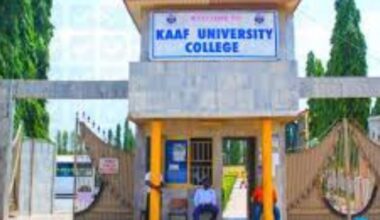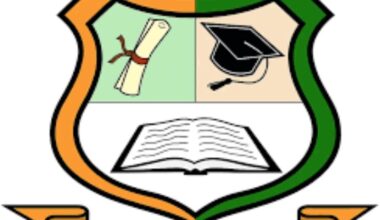Anchor University, located in Ayobo-Ipaja, Lagos, Nigeria, is a private, faith-based institution established in 2016 by the Deeper Christian Life Ministry (DCLM). Known for its commitment to academic excellence, character development, and Christian values, Anchor University offers a range of undergraduate programs in fields like Nursing Science, International Relations, Computer Science, and more. This article provides a detailed exploration of Anchor University, addressing key questions about its nursing school fees, school fees for International Relations, dress code, cut-off mark, and phone policy. The information is sourced from recent web data (2020–2025) to ensure accuracy and relevance.
Overview of Anchor University
Anchor University is a co-educational, evangelical institution with an enrollment of 500–999 students, making it a small but vibrant academic community. The university emphasizes holistic education, combining academic rigor with moral and spiritual development to combat societal challenges like moral degradation. Its programs, accredited by the National Universities Commission (NUC), span disciplines such as Nursing Science, International Relations, Computer Science, Microbiology, and Education. The university’s mission is to foster a learning environment that empowers students through innovative education, research, and community engagement, preparing them for leadership roles in a globalized world.
This article addresses five key subtopics: Anchor University nursing school fees, school fees for International Relations, dress code, cut-off mark, and phone policy, providing prospective and current students with essential information to navigate their academic journey.
Anchor University Nursing School Fees
The cost of studying Nursing Science at Anchor University is a critical consideration for prospective students, particularly those from diverse regions of Nigeria and beyond. For the 2025/2026 academic session, the school fees for Nursing Science for newly admitted undergraduate students are approximately ₦1,200,000. This amount covers tuition and other mandatory fees but excludes additional costs such as accommodation, textbooks, and sundry fees.
Breakdown of Fees
While the exact breakdown may vary, the nursing program fees typically include:
-
Tuition: The core cost of academic instruction.
-
Sundry Fees: Approximately ₦300,000, covering registration, sports, ICT, NHIS, hostel membership, development levy, identity card, matriculation, laboratory coat, and departmental fees.
-
Acceptance Fee: A one-time payment of ₦50,000 for new students.
-
Accommodation: Hostel fees, which vary based on whether students live on-campus or off-campus (off-campus students pay an additional ₦75,000 environmental benefits fee).
Payment Options
Anchor University generally requires fees to be paid in a lump sum, but for the Nursing Science program, students can pay 60% of the school fees before resuming the first semester, with the balance due later in the academic year. Discounts are available, including:
-
10% tuition discount for Deeper Life High School graduates.
-
10% tuition discount for children of full-time Deeper Christian Life Ministry pastors.
-
10% tuition discount for parents with two or more biological children enrolled simultaneously.
-
10% tuition discount for students whose parents are full-time university staff.
Prospective students are advised to use the university’s cost estimator on the official website (aul.edu.ng) to budget effectively. Additionally, scholarships and financial aid may be available, though specific details should be confirmed through the university’s financial aid office.
Anchor University School Fees for International Relations
International Relations is one of Anchor University’s newer programs, introduced to equip students with skills in diplomacy, global politics, and cross-cultural communication. For the 2023/2024 academic session, the school fees for International Relations are approximately ₦650,000 for new students. This amount includes tuition and related fees but excludes accommodation and other expenses.
Additional Costs
Students in the International Relations program should budget for:
-
French Immersion Program: A mandatory program for 300-level students in International Relations, costing ₦200,000. This program, held in Badagry, enhances language skills critical for diplomatic careers.
-
Sundry Fees: Similar to Nursing Science, these fees (approximately ₦300,000) cover registration, ICT, and other services.
-
Accommodation: On-campus housing is prioritized for first-year students, but availability depends on applicant numbers. Off-campus students pay an additional ₦75,000 environmental benefits fee.
Payment Flexibility
Like the Nursing Science program, International Relations students can pay 60% of fees at the start of the first semester, with the remaining balance due before the second semester. The same discount options (e.g., for Deeper Life High School graduates or pastoral families) apply. Students are encouraged to check the university’s payment portal (aul.edu.ng) for online payment instructions and to generate their student ID for verification.
Anchor University Cut-Off Mark
The cut-off mark is a crucial factor for admission into Anchor University. For the 2024/2025 academic session, the university’s minimum cut-off mark is 180, as mandated by the Joint Admissions and Matriculation Board (JAMB). This applies to all undergraduate programs, including Nursing Science and International Relations. However, meeting the cut-off mark does not guarantee admission, as candidates must also pass the Post-UTME screening exercise and meet specific program requirements.
Admission Requirements
To be eligible for admission, candidates must:
-
Score at least 180 in the Unified Tertiary Matriculation Examination (UTME).
-
Have five credit passes in relevant subjects at the Ordinary Level (WAEC, NECO, IGSCE, or NABTEB), including English Language and Mathematics (except for programs like International Relations, where Mathematics is not mandatory).
-
Complete the Post-UTME screening conducted by Anchor University.
-
Pay a non-refundable application fee of ₦20,000.
Candidates awaiting O-Level results can apply for the Post-UTME but must provide their results before final admission. For Nursing Science, relevant subjects include Physics, Chemistry, Biology, and Civic Education, while International Relations may require subjects like Government and History. Anchor University prioritizes candidates who select it as their first choice in JAMB, though second-choice candidates are also considered.
Anchor University Dress Code
As a faith-based institution, Anchor University enforces a strict dress code rooted in Christian principles of modesty, dignity, and natural appearance. The dress code applies to all students and is enforced in lecture halls, examination halls, the university chapel, and during special events like matriculation, convocation, and Sunday worship services. Below are the detailed guidelines for male and female students.
Male Students
-
Corporate Attire: Male students must wear a shirt, necktie, trousers (with or without a jacket), and covered shoes for lectures, exams, and special ceremonies. French suits are permitted.
-
Prohibited Styles: Sagging trousers, unbuttoned long-sleeve shirts, and shirts with offensive inscriptions are banned. Ties paired with canvas shoes are not considered corporate.
-
Hair and Accessories: Jerry curls, treated hair, braided hair, scarves, necklaces, rings, wristbands, earrings, and ankle chains are prohibited. Only conventional wristwatches are allowed. Students must maintain well-cut, combed hair; beards are not permitted.
-
Cultural Exceptions: On national days like Independence Day, traditional attire is allowed.
Female Students
-
Modest Clothing: Dresses and skirts must cover the hip line and not be tight, body-hugging, or made of stretchy materials. Strapless blouses, spaghetti straps, low-cut blouses, and revealing skirts are prohibited.
-
Prohibited Items: Shawls or scarves over dresses, clinging clothing, and blouses that expose the navel are not allowed in academic or campus environments.
-
General Rules: Face caps are banned in lecture rooms, examination halls, and the chapel, except during sports activities.
Philosophy of the Dress Code
Anchor University’s dress code reflects its Christian values, emphasizing natural, modest, and dignified attire. Clothing that resembles the opposite gender, denatures hair, or distracts others is forbidden. The dress code aims to enhance students’ self-confidence, promote a positive academic environment, and align with the university’s mission of character development. Violations, such as sagging or wearing prohibited items, are punishable offenses.
Anchor University Phone Policy
While Anchor University’s official policies do not explicitly detail a phone policy in the provided sources, private, faith-based institutions like Anchor University typically regulate the use of mobile phones to maintain discipline and focus on academic and spiritual activities. Based on the university’s emphasis on character development and a distraction-free environment, it is reasonable to infer the following:
-
Restricted Use in Academic Settings: Phones are likely prohibited or restricted during lectures, examinations, and chapel services to ensure students remain focused. This aligns with the ban on face caps in similar settings, which suggests a broader policy against distractions.
-
General Campus Use: Outside of academic settings, phones are likely permitted for communication, accessing the student portal, or academic purposes (e.g., research or online payments). However, activities that conflict with the university’s values, such as using phones to access inappropriate content, would be prohibited.
-
Recommendations: The university strongly recommends that students own laptops for academic success, suggesting that phones alone may not suffice for coursework, especially in programs like Nursing Science and International Relations.
Students should consult the Anchor University student handbook or contact the administration (via aul.edu.ng) for a definitive phone policy. The lack of explicit mention in available sources suggests that phone use is regulated but not entirely banned, with an emphasis on responsible use aligned with the university’s Christian ethos.
Additional Considerations for Prospective Students
Scholarships and Financial Aid
Anchor University offers limited scholarship opportunities, such as tuition discounts for specific groups (e.g., Deeper Life High School graduates, pastoral families). Students can also explore external scholarships through platforms like ScholarshipPark.com. The university’s cost estimator and financial aid office provide resources to help students manage expenses.
Admission Process
To apply, candidates must:
-
Select Anchor University as their first or second choice in JAMB.
-
Complete the Post-UTME screening form (available after paying the ₦20,000 application fee).
-
Submit required documents, including O-Level results and UTME scores.
-
Meet program-specific requirements, such as subject combinations for Nursing Science or International Relations.
Campus Life
Anchor University fosters a residential campus with diverse housing, dining, and over 600 student organisations. On-campus housing is prioritised for first-year students, but availability is not guaranteed. The university’s evangelical focus shapes its community, with mandatory chapel services and events like convocation ceremonies emphasising spiritual growth.
Academic Programs
Beyond Nursing Science and International Relations, Anchor University offers programs in Information Technology, Physics with Electronics, Biotechnology, Industrial Chemistry, Geology, and Education (e.g., Chemistry Education, Biology Education). The university also provides a conversion program for Higher National Diploma (HND) holders to earn a degree.
Challenges and Considerations
-
Competitive Admission: The 180 cut-off mark is relatively accessible, but the Post-UTME and program-specific requirements make admission competitive.
-
Fee Payment: The lump-sum payment requirement may be challenging for some students, though the 60% initial payment option provides flexibility.
-
Strict Regulations: The dress code and inferred phone restrictions reflect the university’s conservative ethos, which may not suit all students.
-
Limited Enrollment: With 500–999 students, Anchor University offers a close-knit community but may have fewer resources compared to larger institutions.
Recent Updates (2020–2025)
Anchor University has expanded its course offerings, adding 14 new programs, including International Relations, in recent years. The 2024/2025 cut-off mark remains 180, consistent with JAMB’s minimum for private universities. The university’s online payment system and student portal (aul.edu.ng) have streamlined fee payments and admission processes. The 4th and 5th convocation ceremonies, announced in recent years, highlight the university’s growth and commitment to graduating well-rounded students.
Conclusion
Anchor University stands out as a faith-based institution dedicated to academic excellence, character development, and leadership training. For Nursing Science, students can expect fees of approximately ₦1,200,000, while International Relations costs around ₦650,000, with additional expenses like accommodation and sundry fees. The university’s cut-off mark of 180 makes it accessible, but candidates must meet additional requirements through the Post-UTME. The dress code emphasises modesty and professionalism, aligning with the university’s Christian values, while the phone policy likely prioritises academic focus. By understanding these aspects—fees, admission criteria, dress code, and policies—prospective students can make informed decisions about joining Anchor University.
For further details, visit the official website (aul.edu.ng) or contact the admissions office. Anchor University’s commitment to fostering a vibrant, inclusive learning environment makes it a compelling choice for students seeking a blend of academic rigour and moral grounding in Nigeria’s higher education landscape.






